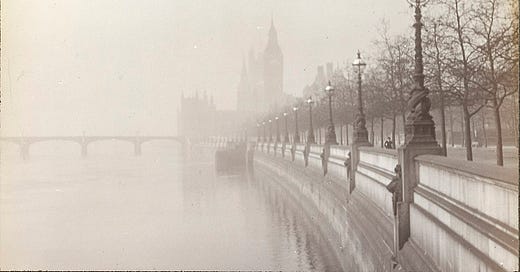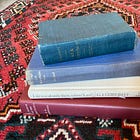Continuing from:
A reminder that all posts assume familiarity with fundamental Fourth Way ideas. For guidance and full citations of abbreviated references, please see:
In connection with climate, Maurice Nicoll wrote,
[Ouspensky] said that England had a bad climate and that winter was something that one had to recover from in England, and that people did not grasp this.1
One has to adapt and adjust to local climatic conditions if one is obliged to live in a certain place. What is necessary then to recover from an English Winter? And what too to prepare for it, and to protect oneself against it at the time? It's not as cold as many countries' Winters, and it's not dark for so long. But it is often damp. And perhaps this in particular affects the quality of the second being-food, or the air one breathes.
How might Ouspensky have advised the recovery from the English winter?
The English climate, even in cold early Spring, seemed to affect Ouspensky less when he stayed with the Nicolls in their cottage by the sea at Sidlesham, sometimes every other weekend,2 which he attributed to the quality of the air.
Ouspensky found that he slept better at the cottage than he had for a long time and remarked that he had been able to sleep with his windows open without feeling the cold whereas in London he would have been chilled as it was early spring. He thought that this was because the air was so good.3
The octave of the digestion of ordinary food and drink is, as described by Gurdjieff, for example, in the details given of the three storey factory in In Search of the Miraculous, dependent on the natural progress of the beginning of the air octave to help it pass the Mi-Fa interval from H192 to H96,4 the bridge to the "psychic energies."5 If the air is not good, then it could affect many systems.
One means of preventing or recovering from a cold damp Winter could be various forms of heat, especially the stimulation of internal heat. Ouspensky seemed enthusiastic about physical work,6 which goes some way towards keeping oneself warm, giving work for the moving centre, and keeping the physical circulation going strongly, as well as helping relaxation.
Nicoll may not have kept his various communal houses very warm,7 similarly to the Prieuré. For example, Katherine Mansfield wrote, in December 1922, when she was at Gurdjieff’s Institute for the Harmonious Development of Man at the Prieuré, Fontainebleau-Avon:
It is intensely cold here and very damp. Very rarely the house is heated. I have a fire in my little room though . . .8
These sub-optimal temperatures for comfort help in keeping the body accustomed to warming itself. Nicoll wrote in his diary in January 1941:
This house very cold - and the usual coughs and flu' - this illness called an English winter.9
However, Nicoll spoke differently about snow:
To me the message of the snow is always the same - rest, think, read, be calm, for this is the time of quiescence and peace - but the momentum of modern life drives through all these natural messages and ignores them. We seem long ago to have lost all harmony with nature - in fact, all harmony with ourselves - and live strange unreal existences.10
Gurdjieff may also have struggled with the English climate, given a remark he made in a London talk in 1922:
One center of our machine cannot change another center. For example: in London I am irritable, the weather and the climate dispirit me and make me bad-tempered, whereas in India I am good-tempered. Therefore my judgment tells me to go to India and I shall drive out the emotion of irritability. But then, in London, I find I can work; in the tropics not as well. And so, there I should be irritable for another reason. You see, emotions exist independently of the judgment and you cannot alter one by means of the other.11
So, was it the cold dampness that was the particular problem Ouspensky had with the English Winter?
And then what is a damp place psychologically? Perhaps despondency, sluggishness and so on, are consequences of psychological dampness. Nicoll talks a little about damp places as internal states, speaking of "damp, negative states, which, as it were, turn one's whole psychological country into marshland filled with venomous mosquitoes."12 He also wrote of the emotional centre, or,
This middle laboratory, which we can suppose, by rough analogy, to be full of the most delicate and intricate chemical and electrical apparatus, demands, as it were, a constant temperature, complete freedom from damp, and absence of noise and vibration, in order to carry out its work.13
Psychological damp being far more dangerous than damp from the external climate, the precautions against the former seem especially important. Nicoll seemed to have hit on the perfect prophylactic and remedy - he writes in his diary:
"A grand day of pouring rain. Tonight a good party with our friends at the house up the hill. Some acting . . . We all . . . enjoyed ourselves, which is the great and most blessed thing. The one thing is: enjoy yourself. Try, and see how difficult this is! All of us spend most of the time in being unhappy, depressed, angry, jealous, sad, etc. That means that to enjoy oneself requires a lot of effort and conscious living.14
Continued in:






